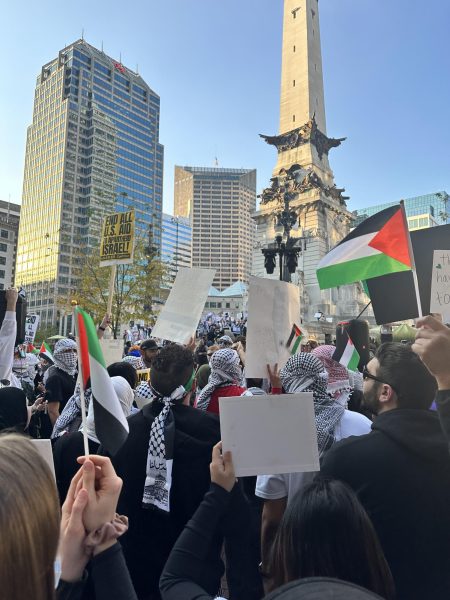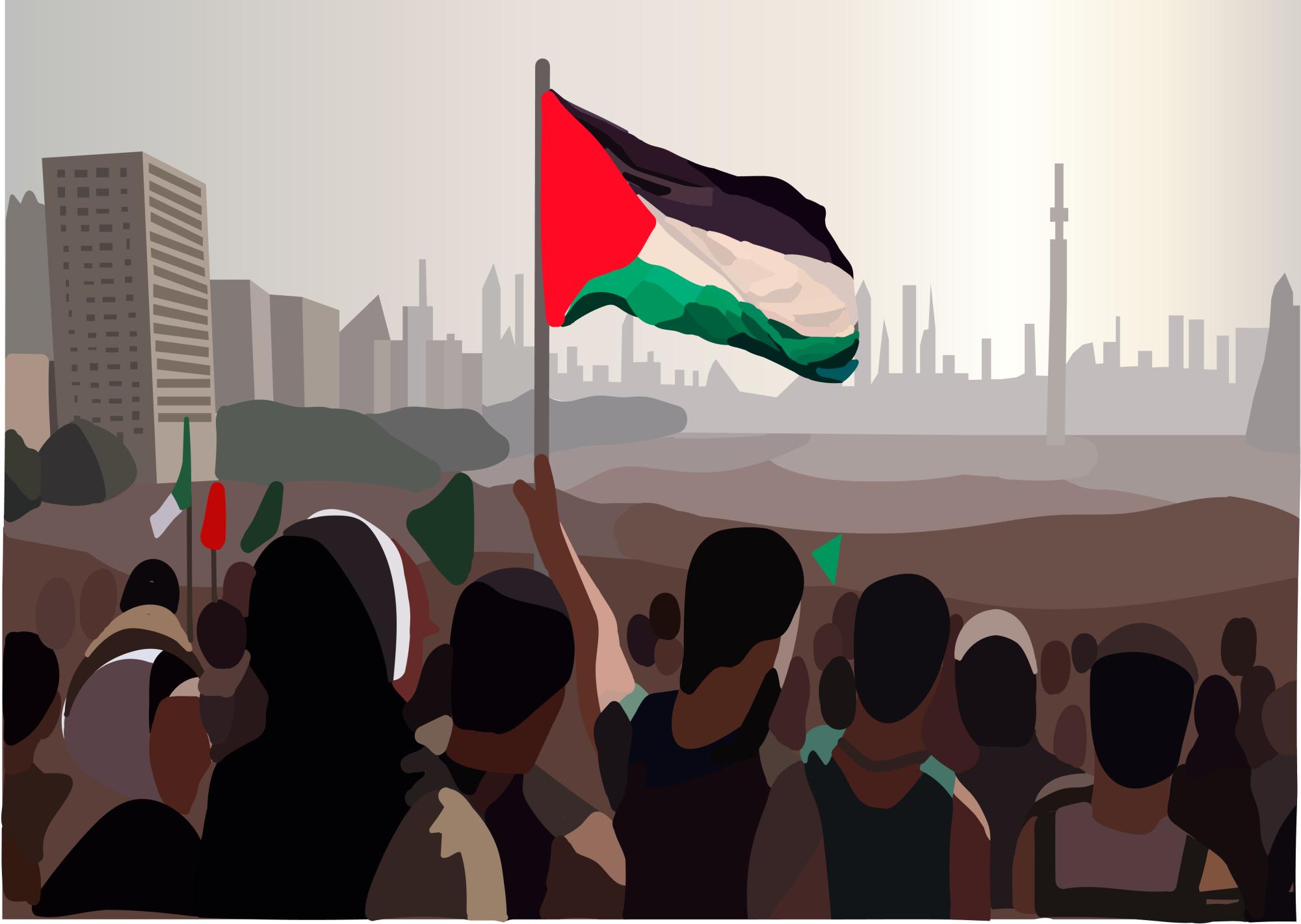According to the Palestinian Health Ministry, as of Jan. 21, more than 25,000 people have died in Gaza as a result of the Israeli-Palestinian conflict, which began in October.

Junior Sara Syed said she never expected her religious homeland and her people to be subjected to a sky of bullets and bombs. Syed said, to her, Palestine is holy land, making the conflict a subject she is passionate to talk about.
“My friends and family definitely do discuss the issue, just because, as a Muslim, Palestine is holy land, so we always talk about how important it is that our own people live under a gray sky with smoke from bombs and bullets and warfare,” she said. “I just think it’s important to talk about it and realize the privilege that we have over here.”
Sage Mehta, who graduated from Carmel in 2022, is now an international affairs major at the University of Pennsylvania. Mehta said it is essential to have conversations with people who harbor diverse views regarding the conflict.
“I know I’ve been talking to people from diverse political stances and with diverse experiences about the conflict,” Mehta said. “Honestly, no matter who you talk to, once you really do start having more of those informed discussions, you can understand that most people have a lot of the same commonalities—namely, that we should preserve civilian lives on both sides of the conflict and seek some sort of resolution that does the least damage without getting into the ideological weeds that oppress one group or the other.”
Impact on relationships
But, having those discussions, Syed said, is not always easy. She said voicing her pro-Palestinian stance has strained friendships with people with differing views.
“I think the conflict has pointed out who has the same morals as me, and I have definitely lost some friends over it. You can’t have a different perspective on genocide,” Syed said. “In other aspects, I have family in Palestine, so it is just heartbreaking to see that. You can’t talk to them, you don’t know how they are. It’s just scary.”
Syed said she often feels judged for her perspective on the conflict. However, she said she tries to focus on the bigger picture and deeper meaning.
She said, “I don’t really mind people forming biases and opinions on me based on what I post and my views, which I am pretty open about, just because I think there are bigger issues in the world, and I don’t really care if people form an opinion about me over that. If I lose a couple of friends over my beliefs, I’m okay with that.”
Like Syed, Aleeza Asad, Palestine supporter and junior, said she has also lost friends due to her beliefs.
“I had a bunch of friends who supported the opposite side of the war, and because of that, they cut themselves off from me,” Asad said. “But I think it is definitely possible to coexist with different beliefs as long as you are respectful about it.”
But at the same time, Syed said she is still able to understand those who support Israel.
“I understand the people that are pro-Israel, but I understand to an extent,” Syed said. “Like I understand that Jews have been persecuted in the past, and they want a space to feel safe; I, 1000% support that, and I think that’s so important to create a safe space for everyone. But I don’t think that should come at the cost of another population. I don’t think that means we need to cleanse all Palestinians or Gazans ethnically.”
Like Syed, Asad said she understands the contrasting perspectives in the conflict.
“I do see where people on the other side are coming from. I don’t agree with them, personally, but I do sympathize with the people,” Asad said.
Stereotypes on the conflict
Syed said a common stereotype is that all Palestinian supporters are antisemitic.
“A lot of people think that being pro-Palestine is antisemitic, and it’s not because it’s not against Jews or Judaism its against Zionism,” Syed said. “It’s against ending apartheid and ending oppression.”
However, being in support of one group in the conflict, Asad said, does not mean she wishes ill on the other side.
“People just need to understand that just because we support one side of the conflict doesn’t mean we hate the people on the other side,” Asad said.
Social media on information spread
Syed said people should ensure the validity of the information spreading on social media, regardless of their position.
“Even a little bit of misinformation can be really detrimental to your case,” Syed said. “It’s propaganda from both sides, and there’s much of it. We need to focus on the truth and just (spread) the truth.
“When I see someone post something, especially if it has data, I always do a deep dive,” she added. “I think understanding everyone’s perspective is important, so I always research and try to see where they are coming from or if I don’t agree or I think it’s misinformation, then I’ll swipe up and send them sources and tell them why they are incorrect and why what they’re posting is misinformation or propaganda.”
When used properly, Syed said social media can help spread truthful information about the conflict.
“I have used social media to spread information, but not as much as others, just because I think it is important to post true information and research everything you are reposting,” she said.
Asad said many Americans tend to ignore conflicts if they do not involve the United States, and said she uses social media to draw the attention of those around her to the conflict.
“I use social media a lot to post about the conflict and organization and rallies and what to do. I post to show awareness because history is repeating itself. I want people to see that, just because it is not in America, it is still important,” she said. “There are genocides happening on other sides of the world.”
Along those lines, Mehta said the American government needs to promote respect on both sides of the conflict.
“I think it's a nuanced topic,” Mehta said. “I don't think the leaders are, anytime soon, going to come to a really good agreement, but I think that's what we should urge. Until then, we should call for things like a cease-fire or just try to mitigate conflict as much as possible. I think the U.S. policy to just unabashedly support one side of the conflict has done much more harm than good and I think it doesn't consider some of these nuances of the conflict and I think that we as the United States need a more holistic policy that takes into account.”
Syed said she noticed many high school activists stop posting due to the conflict.
“I’ve seen people who used to post all the time and different issues go completely silent, which is just weird because I think it’s important that everyone just speak up and spread as much true information as possible because it’s such a big issue in the world,” she said. “In general, its just really alarming if you are silent over such a massive issue.”
CHS on respect
For her part, Syed said she thinks this school should offer a history lesson to educate students and staff on the past events of current conflicts to create a more accepting environment.
“Carmel needs to welcome these conversations and let their students know that everyone is welcome and respected in this school. I think that we need to teach the history of what is going on in that region because I think it is really important to stay educated,” she said.
Moreover, Asad said her teachers should try and control hateful comments within the classroom.
“I think that teachers should advise students to not make any hate comments towards these people, or just to support everybody,” she said. “Maybe implementing a mandatory education course during SSRT could help people understand what the conflict is exactly, and help them gain truthful information.”
Mehta said fostering education and conversation on both sides of the conflict could be beneficial to spreading awareness.
“I think that it's just important for administration to foster discussion on both sides. People could be going through something really difficult with these topics, and they need to be handled and a respectful manner,” Mehta said.
Ultimately, in light of the ongoing Israeli-Palestinian conflict, Syed said she encourages peace.
“If I had a chance to talk to people supporting the other side, I would say we need peace, and peace cannot be achieved through more violence, and you can not continue pushing an apartheid government and genocide and ethnic cleansing and occupation and just expect people to be okay with that because it is not okay,” she said. “People just need to push for peace.”




John Doe • Feb 1, 2024 at 10:41 am
Although this article is VERY well written, it’s important to acknowledge a noticeable pro-Palestinian bias in the framing, choice of quotes, and overall tone. While individual experiences are crucial, a more balanced representation of perspectives would contribute to a more comprehensive understanding of this complex issue.